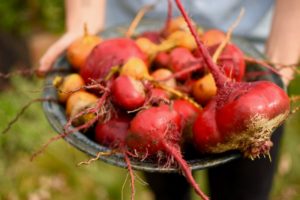Crops to Diversify Your Urban Farm
by: Lettie Stratton

Photo by Jazz Marie Photography
Any farmer knows that it can be difficult to make a living on a small farm. There’s only a certain amount you can charge for vegetables, no matter how beautiful, organic, or heirloom they may be. The challenge of creating a viable business is one of the major barriers to people entering the field of farming in the first place.
Luckily, there are many ways in which you can diversify your small farm to increase profit and the overall health of your operation. Value-added and high-value crops and products can contribute to the economic health of a farming operation, as can the introduction of animal products and increased crop variety. Let’s take a look:
Diversification
To start, we need to understand why diversification is important, not only for financial health but also for environmental health. A diverse farm is often a sustainable farm, and diversification is something that makes urban farming fun.
Diversification also helps us open our minds to unfamiliar flavors and new experiences with food, which can be especially important for children and their future health and eating habits. When visiting the average grocery store, we only see a tiny sliver of the variety of foods that exist in the world. We see bell peppers, iceberg lettuce, and orange carrots.
Often, the purple cauliflower, unique and ancient peppers, and rainbow carrots are missing from shelves. When diverse farms become a mainstay in the food landscape of America, consumers will demand variety and demand change from the monoculture farms that threaten our food security around the world.
Specialty Crops
Growing specialty and high-value crops like microgreens, fruits, nuts, and rare vegetable crops is another great way to diversify your urban farm. Someone of these crops require special skills, knowledge, equipment, or methods to grow, therefore making them rarer and more valuable than some of the more classic garden staples like carrots and lettuce.
Microgreens, for example, are great because you can grow them year-round. Customers will pay more for fresh greens in the winter than they will in summer, so oftentimes adding thoughts about seasonality to your farm plan will help in your quest for diversification and increased profitability.
Herbs & Herbal Products
Taking advantage of both medicinal and culinary herbs and the many products that can be made from them is a great way to diversify your urban farm. Herbs have long been used as natural alternatives to painkillers, healthy and tasty additions to food, and lifestyle and wellness enhancers.
Try drying herbs and making cooking blends, making herbal body products, or even tea blends. The options with both fresh and dried herbs are endless and can help increase the diversity and profitability of your urban farming operation.
Value-Added Goods
Value-added goods are a great way to turn a low-value crop or product into something that can help you turn a profit. Take basil for example. Basil is great, but probably not a huge money maker unless you’re growing it in huge quantities. But if you turn that basil into pesto, suddenly you have a high-value product to offer your customers.
You can add value to almost any farm product. Dried fruit, pickled vegetables, canned fruit, sauces, ground nuts or grains — you name it, you can add value to it with a little extra work. The price tag will make the added effort worth it.
Animal Products
Integrating animals into your farm requires quite a bit of extra work, but the payoff is worth it if you have the knowledge and skills to maintain the operation. Animals also often bring the happiness and sustainability level of the farm to a new level. Who doesn’t love to see chickens happily pecking away when walking out to weed the beets?
Eggs, honey, and dairy products like milk and cheese are great places to start, especially if you’re not interested in getting into meat production and the many rules and requirements that go along with that. Including planting for bees in your farm plan will also help increase the sustainability and health of your farm, as bees are essential pollinators for any thriving habitat.
The next time the realities and challenges of farming are getting you down, consider diversification as a solution for both financial and environmental health. Specialty crops, value-added goods, and animal products can help you make a diversified farm a reality.
About this author:
 Lettie Stratton is a writer and urban farmer in Boise, ID. A Vermont native, she is a lover of travel, tea, bicycles, plants, cooperative board games, and the outdoors. She’s still waiting for a letter from Hogwarts. Bylines include Food Tank, Edible Idaho, The Female Farmer Project, & Whole Terrain.
Lettie Stratton is a writer and urban farmer in Boise, ID. A Vermont native, she is a lover of travel, tea, bicycles, plants, cooperative board games, and the outdoors. She’s still waiting for a letter from Hogwarts. Bylines include Food Tank, Edible Idaho, The Female Farmer Project, & Whole Terrain.
We welcome Lettie to our team of Urban Farm Bloggers. Stay tuned for more articles from her!
*Disclosure:
Some of the links in our podcast show notes and blog posts are affiliate links and if you go through them to make a purchase, we will earn a nominal commission at no cost to you. We offer links to items recommended by our podcast guests and guest writers as a service to our audience and these items are not selected because of the commission we receive from your purchases. We know the decision is yours, and whether you decide to buy something is completely up to you.








